Note from the Editors: The website of the Global Network of Psychologists for Human Rights (GNPHR) contains articles, events and news about the domain where psychology and human rights intersect. The information presented in this Bulletin is gathered from many sources and reflects many opinions. The publication of information does not imply that the GNPHR as a network, the GNPHR Steering Committee as a committee, or the individual subscribers share the views and beliefs expressed. The goal of the many opinions expressed is to stimulate reflection, discussion, and informed dialogue.

Table of Contents
SPECIAL FOCUS: Human Rights Day, December 10
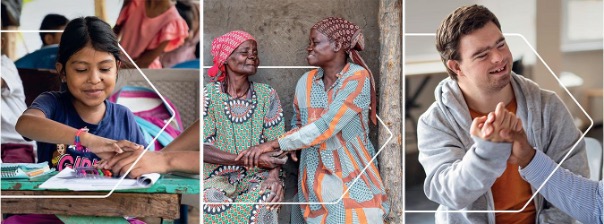
Human Rights Day, December 10. About Our Rights, Our Future, Right Now
The topic of Human Rights Day 2024 is “Freedom, Equality, and Justice for All
Human rights can empower individuals and communities to forge a better tomorrow. By embracing and trusting the full power of human rights as the path to the world we want, we can become more peaceful, equal and sustainable.
This Human Rights Day we focus on how human rights are a pathway to solutions, playing a critical role as a preventative, protective and transformative force for good.
Human rights impact everyone, every day and in this campaign, Our Rights, Our Future, Right Now, we will show the tangible impact of human rights by focusing on relevant global issues, showcasing impact, successes and practical solutions. This continues the forward-looking work of UN Human Rights Chief Volker Türk’s vision statement, Human Rights: A Path for Solutions, presented as the wrap up to Human Rights 75, which commemorated the 75th anniversary of the Universal Declaration of Human Rights. This time, we hope to inspire everyone to acknowledge the importance and relevance of human rights, change perceptions by countering negative stereotypes and misconceptions and mobilize action to reinvigorate a global movement for human rights.
GNPHR Blogs for Human Rights Day
SPECIAL COMMEMORATIVE DAYS – UN
Special UN Days for December 2024 include:
- December 2, International Day for the Abolition of Slavery
- December 3, International Day of persons with Disabilities
- December 9, International Day of Commemoration and Dignity of the Victims of the Crime of Genocide and of the Prevention of this Crime
- December 10, Human Rights Day
- December 18, International Migrants Day
GNPHR NEWS AND EVENTS
Psychologist nominated by the GNPHR Steering Committee received Human Rights Award

Dr. Nora Sveaass has been named as the 2024 ICP Human Rights Award recipient.
Throughout the course of her career, Dr. Nora Sveaass, Professor Emerita at the University of Oslo, has been devoted to protecting human rights through global education, research, service and advocacy. Her contributions include a key leadership role in the development of the Health and Human Rights Information Organization as well as establishment of the Norwegian Psychological Association Human Rights Section, the first European section of human rights in a national psychological association. The attention Dr. Sveaass has given to human rights has had a significant positive impact on refugees across the world with particular focus on individuals with special needs and victims of conflict and violence. Dr. Sveaass’ commitment to human rights resulted in development of the first intensive training program in ethics, law and human rights for psychologists.
Nora Sveaass has been a groundbreaking leader in supporting some of the most vulnerable people in the world and doing so over the decades of her career. Human dignity is clearly not just a career focus for Dr. Sveaass, but a principle to which she is devoted as a psychologist and a person.
New Content area in the Bulletin:
Democracy and Human Rights
The GNPHR Bulletin has a new content area, where we publish communiques from academics and psychology organizations about human rights and political systems.
GNPHR Network of HR Groups in Psychology Associations
On November 7, the GNPHR Network of Human Rights Groups in Psychology Associations held its first meeting since relaunching the group this fall. This marked an opportunity to reconnect and refocus on the key aim of cultivating and supporting human rights efforts. The meeting brought together psychologists and human rights advocates from various countries, sharing their experiences and discussing plans for the future. The group included clinical psychologists, educators, students, and advocates with experience in a wide range of human rights issues. Minutes are available on the GNPHR website.
Psychologist Nora Sveaass described her extensive work in human rights, including her efforts in Norway and internationally, where she has worked with refugees and survivors of trauma. Nora’s presentation on her work over decades have lessons for us today. This is available on the GNPHR website. The next meeting will have another speaker who will also outline the work of their psychology association.
The discussion included updates from psychology associations.
- Elaine Rogers described her work with the Psychological Society of Ireland (PSI).
- Shakiba Moghadam spoke about her role as chair of the British Psychological Society’s (BPS) Human Rights Group and the work it and rthe BPS were doing. She also shared her experience as a former refugee and her work with displaced communities.
- Carlotta Raby also from the UK, detailed her work with Trauma Treatment International; supporting those affected by trauma and collective violence, and drawing also on her clinical experience in the NHS and in human rights work.
- Members from the Netherlands (NIP) shared insights into their active Human Rights and Psychology Network, and Polli Hagenaars described her long-standing advocacy for non-discrimination and inclusion in psychology through the Netherlands Institute of Psychology. In addition, Debora Di Scala spoke about her involvement in the Netherlands Human Rights and Psychology Network and her interest in integrating human rights into clinical practice; Demetra Korogiannou shared her journey from Greece to the Netherlands, focusing on how she applies human rights principles to her work as a psychologist; and Dandrea Reeder shared her perspective as a student of conflict studies and human rights in the Netherlands.
Practical applications of psychology in addressing human rights were a key focus: Shakiba Moghadam (UK) shared her work with refugees and asylum seekers, emphasising the importance of psychological support in protecting human rights; Derek Indoe (UK) discussed his international work on trauma, particularly in the Middle East and Brazil; and George Drazenovich (Canada) spoke about integrating decolonisation into psychology and the importance of including Indigenous perspectives.
The group also discussed how to strengthen communication and outreach, including through the website, and the GNPHR monthly Bulletin, steps seen as essential to maintaining the group’s focus and ensuring its long-term impact.
The group will meet three times a year.
Webinar Series Human Rights Education
Next Webinar in February 2025
For past Webinars, see: https://humanrightspsychology.org/webinars/
CONTENT AREAS AND NEWS
General
What is Psychological Injustice? A concept whose time has come.
Isaac Prilleltensky. Psychology Today, November 2022. Psychological Injustice: The Missing Link
There is one fundamental human need that is violated in all cases of unfair treatment, and that is the need to matter (Kruglanski et al., 2022; Prilleltensky & Prilleltensky, 2021). Mattering consists of feeling valued and adding value. When we commit an injustice, we are not only depriving individuals of a certain good or service, but we are also depriving them of their humanity, dignity, mattering, respect, and social worth. I argue that the central mechanism in all forms of injustice is a violation of mattering by making people feel devalued and disrespected, and preventing them from adding value and making a contribution, either to themselves or others. When certain minorities are told that they are not good in math or science, we are both devaluing their talents and depriving them of opportunities to excel in these fields (Steele, 2010). The rise of the #BlackLivesMatter movement is a response to historical injustices that made Black people feel devalued and prevented them from being full members of society (Taylor, 2016). In fact, for centuries, the struggle for recognition has been about claiming dignity, mattering, and significance (Honneth, 1995).
When we violate the basic need to matter, we engage in an act of psychological injustice. Thus, we can define psychological injustice as the violation of others’ fundamental need to matter.
Prominent Indigenous psychologist recognised with Australian humanities honour. The University of Western Australia, 28/11/2024.
Professor Pat Dudgeon AM, a pioneering Indigenous psychologist, has been elected a Fellow of the Australian Academy of the Humanities, the highest honour in Australian humanities.
The Academy advances knowledge of, and the pursuit of, excellence in the humanities.
A Bardi woman from UWA’s School of Indigenous Studies and the first Aboriginal psychologist to graduate in Australia, Professor Dudgeon was among 41 Fellows elected to the Academy in 2024, reflecting Australia’s diverse learned humanities community. Professor Dudgeon’s work has profoundly impacted Indigenous mental health, social and emotional wellbeing, and suicide prevention.
Climate Justice
Climate change and mental health: direct, indirect, and intersectional effects. Andreas Heinza & Lasse Brandt, THE LANCET Regional Health Europe, Vol. 43, August 2024.
Climate change is progressing rapidly and poses a threat to human physical and mental health. The human contribution to rising temperatures is well established, and data on the direct, indirect, and intersectional effects of climate change on mental health are increasing.
This commentary highlights key aspects of the direct, indirect, and intersectional impacts of climate change on mental health.
According to a recent meta-analysis, at high ambient temperatures a 1 ◦C increase in temperature is associated with a 0.9% increase in mental health-related morbidity based on data from Asia, Oceania, Europe, and North and South America.
Migration and Environmental Change in Morocco: Findings, New Developments and Challenges. Universität Wien, December 2023. Mobility Lecture #16 with Lore Van Praag, Erasmus University Rotterdam.
Combining insights from migration and climate adaptation studies, in this session of the Mobility lectures, Lore Van Praag will start by discussing her fieldwork on environmental mobility in Tangier and Tinghir in Morocco and how these mobility patterns are related to transnational ties many people have with European countries, such as Belgium. During this fieldwork, gender dynamics, religious and spiritual interpretations, lifestyle expectations, intergenerational and intragenerational differences in (environmental) mobility patterns and aspirations were noted. She will discuss how these empirical findings contributed to gaining new insights for the field of environmental mobility, as well as how it adds to existing theoretical frameworks. Finally, these empirical findings will be used as a starting point to discuss the upcoming challenges when conducting fieldwork on environmental mobilities in the Moroccan context and how these insights can be applied to other contexts. In doing so, we aim to reflect upon future pathways to advance in this field of research and to apply to current policymaking. See also
Climate Migration 101: An Explainer. Lawrence Huang, Migration Information Center, November 16, 2023.
Human mobility linked to environmental drivers is not new, but global climate change is triggering more internal and international migration and displacement. Sometimes, the impacts of climate change are fairly direct. For instance, more than 1 million Somalis were displaced by drought in 2022, primarily within Somalia. Other times, impacts are more indirect, as it can be hard to trace how rising global temperatures threaten jobs and livelihoods that compel migration. In rural Honduras and Guatemala, for instance, these impacts have combined and amplified other drivers to prompt people to move to cities, the United States, and other destinations.
Assessing populations exposed to climate change: a focus on Africa in a global context. Daniela Ghio, Anne Goujon, Fabrizio Natale, Thomas Petroliagkis. Researchgate, November 2023.
The recent debate on population dynamics and climate change has highlighted the importance of assessing and quantifying disparities in populations’ vulnerability and adopting a forward-looking manner when considering the potential impacts of climate change on different communities and regions. In this article, we overlay demographic projections based on the Shared Socioeconomic Pathways and climate change projections derived from the Representative Concentration Pathways. We focus on populations that are likely to be the most exposed to climate change in the future, namely, African populations in a comparative global context. First, we estimate the share of populations living in rural areas, who would be more dependent on agriculture, as one of the economic sectors mostly affected by climate change. Second, we explore how climate change would worsen the condition of populations living below the poverty line. Finally, we account for low levels of education, as further factors limiting people’s adaptation ability to increasingly adverse climate circumstances. Our contribution to the literature on population, agriculture, and environmental change is twofold. Firstly, by mapping the potential populations exposed to climate change, in terms of declining agricultural yields, we identify vulnerable areas, allowing for the development of targeted strategies and interventions to mitigate the impacts, ensure resilience, and protect the population living in the most affected areas. Secondly, we assess differentials in the vulnerability of local populations, showing how African regions would become among one of the most exposed to climate change by the end of the century. The findings support the targeting of policy measures to prevent increased vulnerability among already disadvantaged populations. Figures here
Decolonization / Indigenization
Norway Apologizes for Forced Assimilation of Sami and Other Minorities. Lynsey Chutel, NY Times, November 14, 2024.
A policy of “Norwegianization” silenced the languages of Indigenous people and forced their children into boarding schools. The long-awaited apology avoided the issue of land rights.
For more than a century, Norway forcibly suppressed the language and culture of Indigenous people and other minority groups, including removing children from their parents, in a system of “Norwegianization” whose devastation continues to be felt.
Norway has some legislation on the Samis’ right to grazing land, but the Sami have long been at odds with the government over land use in relation to their culture and way of life.
The apology and resolutions stem from a report by a Truth and Reconciliation Commission, published last year, that outlines how Norway could begin to reckon with its oppressive past. King Harald V has previously apologized to the Sami people, but this is the first time that the Kvens and Forest Finns have received such a public acknowledgment of the harm they endured.
“The assimilation policy that was historically pursued continues to be both the root of personal hardship for the individuals and groups that were subject to this policy, and a source of conflict today,” Svein Harberg, a Conservative Party lawmaker, said in a written response to a reporter’s questions after the apology was read out in Parliament.
Democracy and Human Rights
Undercover: Exposing the Far Right. Review – Leila Latif. The Guardian, 22 October 2024.
Review – the bravest documentary of the year so far.
Nail-biting and terrifying, this film shows us the essential work of Hope Not Hate, a group who use hidden cameras and incredibly treacherous fieldwork to expose the threat of extremism around the world. Undercover: Exposing the Far Right is on Channel 4
Be part of a movement standing against hate and building stronger, united communities. Take action today—sign up to join our community, support our mission with a donation, or explore our latest research and reports to learn more.
Far-right governments seek to cut billions of euros from research in Europe. Anti-immigration parties are pushing policies that are hostile or indifferent towards science. David Matthews, Nature, 28 October 2024.
A surge in far-right parties entering governments across Europe is raising concerns for science. The parties, whose focus is typically immigration, care little about research, say policy experts. In the Netherlands — where the Party for Freedom (PVV), led by the anti-Islam firebrand Geert Wilders, entered a coalition government in July — researchers are bracing for €1 billion (US$1.1 billion) in cuts to the budget, the worst in decades.
“We’re talking about historic cutbacks,” says Caspar van den Berg, president of the Universities of the Netherlands umbrella body. “It’s really striking how research, education, innovation is being hit the hardest of all sectors.”
 Challenges to Democracy and the Future of Capitalism. Social research: an International quarterly Vol. 91, No. 3, Fall 2024.
Challenges to Democracy and the Future of Capitalism. Social research: an International quarterly Vol. 91, No. 3, Fall 2024.
This issue of Social Research addresses several crucial questions. What are the economic forces that spurred the growth of antidemocratic regimes and policies? Can economics reverse this trend? In other words, can the discipline that contributed to the current antidemocratic wave also point the way forward? This is an interdisciplinary collection, comprised of essays by scholars from economics, history, and political science, all of whom are grappling with one question: What is the future of capitalism in the face of the widespread retreat of democracy?
Displaced/Migrants/Refugees/Stateless
Socio-psychological perspectives on climate-related migration: A systematic review and research agenda. Maria Fernandes-Jesus, Annalisa Cecconi, Francesca Esposito, Maria Vargas-Moniz, Cinzia Albanesi, Universita del Salento, Vol. 10, 2, 2024.
There have been multiple calls to examine the links between climate change and migration across different fields. This article reviews climate-related migration from a socio-psychological perspective. It examines the topics covered in existing literature, the geographical distribution of studies, and the theoretical and methodological frameworks adopted. A systematic search in peer-reviewed databases was conducted, following PRISMA guidelines and covering studies published until 2 June 2023. Peer-reviewed articles focusing on human climate-related migration, reporting empirical data, and addressing socio-psychological dimensions and/or approaches were included. In total, 25 studies were analysed. Results suggested an increasing interest in the topic in the last decade and that most studies focused on internal migrants. From a methodological perspective, we found a lack of studies using critical and participatory methodologies. Additionally, our narrative synthesis suggested that: socio-political and climate vulnerabilities are intertwined; dimensions of place attachment and sense of community are key in explaining how people deal with climate change and decide to remain or to migrate; communities affected by climate change and climate-related migration face health and well-being challenges. Finally, a few studies suggested the importance of looking at public attitudes towards climate migrants and recognising climate justice dimensions in climate migration. We critically discuss these and other results and possible avenues for future research in the fields of social and community psychology.
Forced Migration, Social Exclusion and Poverty: Introduction. Graham R. Davidson & Stuart C. Carr, Journal of pacific RIM Psychology, May 2010.
This special issue of the journal, which is part of a global research initiative on psychology and poverty reduction, focuses specifically on the experiences of refugees and asylum seekers. Application of contemporary constructions of relative poverty and social exclusion to understanding asylum and humanitarian refuge emphasises the relative financial and social disadvantages experienced by many of these forced migrants, which may lead subsequently to them having negativeexperiences of resettlement and poor mental health and overall wellbeing. We argue that governments need to be cognisant of the poverty pitfalls of forced migration and to examine carefully their policies on social inclusion to ensure that current and future humanitarian and climate change refugees arriving on their shores are not forced into relative poverty.
Human Rights Education
Inclusive Education – Knowledge Platform. Erasmus University Rotterdam.
The knowledge platform is meant to inspire you as an educator, by providing comprehensible information about the various tools and trainings, that you can implement or bring into your learning space for yourself and your students, to be able to create an inclusive learning environment. It is structured on four pillars which outline the four main areas of focus in practicing inclusive education: Community Building, Connective Communication, Critical Self-Reflection, and Contextualization of Knowledge. Underneath each of the pillars are several resources (what we call toolboxes) focusing on more practical and specific interventions.
The Inclusive Education Dilemma Game is created by IDEA Center of our university and aims to initiate discussions among participants about issues related to inclusive education, and to help them find solutions together.
The game is a conversation starter that encourages participants to think about a real life dilemmas from the perspective of ‘an educator’ in a learning environment and think of a possible solution. There is no right or wrong solution. The game provides an opportunity to exchange ideas or experiences and help find a common ground on certain principles.
The Goal
- The purpose of the game is to initiate conversation among participants on topics pertaining to inclusive education and develop a better understanding of the subject from various standpoints.
- It helps participants reflect and articulate strategies as solutions to some of the common dilemma situations in the classroom.
- It offers an opportunity for the participants to empathize with different roles (educator or student) and facilitates the sharing of views, experiences, and good practices.
Download here
LGBTQI+, Gender Rights
LGBTIQ at a crossroads: progress and challenges. EU Agency for Fundamental Rights, 14 May 2024
FRA’s third LGBTIQ survey shows that people still experience hate-motivated violence and discrimination. Trans and intersex people face even greater victimisation. Yet, signs of progress show that the EU’s and Member States’ efforts can positively affect people’s lives. More LGBTIQ people are open about their sexual orientation, gender identity, gender expression and sex characteristics.
When therapy is not therapy. Editorial, The Lancet Psychiatry, Vol 9 April 2022
Psychiatry has an ugly history concerning sexual orientation and gender, having previously pathologized those attracted to the same sex or who did not conform to feminine or masculine norms. After late-19th century psychiatrists attempted to explain what they saw as innate morbid conditions, early 20th-century psychoanalytic approaches viewed homosexuality as truncated psychosexual development linked to family dynamics and treatable with therapy.
Behaviourism added aversion therapy to the toolkit in the 1960s, while cognitive therapists tried to change thought patterns. The position of psychiatry has long since changed—homosexuality was removed from DSM-III-R in 1987 and from ICD-10 in 1992, and minority gender identity was scaled back to gender incongruence or dysphoria. But conversion therapies are not consigned to history.
Efforts to change someone’s sexual orientation or gender identity and expression (SOGIE) are not well documented, but they have been reported in at least 60 countries in all world regions. These efforts span talk therapies, prayer and religious rituals (eg, exorcism), physical deprivation, aversion therapy (eg, inducing nausea), electroconvulsive therapy, and medication. They are carried out by religious leaders, traditional healers, and private and public mental health professionals. Few of those receiving conversion therapies have sought them out themselves; many are brought by family members, driven by a combination of religion, family honour, and cultural pressure. Although various national governments are currently working towards banning conversion therapy, only five countries have a complete ban and 13 have partial bans.
Mental Health and Human Rights
MESUR. Mental Health Support for Ukrainian Refugees.
Pivoting: Responding to the Mental Health Needs of Youth of Color With Technology. Riana E. Anderson, Madison P. McCall, Nana Otaka, Current directions in psychological science, APS, November 2024.
Mental health treatments currently available to address racial discrimination for 21 million youth of color are inadequate. Given the nascent but promising mechanisms found within behavioral health interventions via racial socialization, or the process through which children acquire knowledge about race, developing effective and scalable therapeutic strategies to contend with the stress from racism and discrimination is possible. We outline the active ingredients that facilitate behavioral change for youth psychosocial outcomes impacted by racial discrimination and describe how technology is being utilized for current and future implementation efforts. We argue that technological advancement, in addition to ecological considerations, is crucial for the reduction of structural and interpersonal risk factors negatively influencing the psychological wellness of youth of color. Technology integration across implementation and assessment will be critical, particularly given the potential for technology to further exacerbate mental health disparities.
Persons with Disability
The International Day of Persons with Disabilities, commemorated each year on December 3, provides an opportunity to renew commitments, call for accountability, and advocate for decisive action to address the unique challenges faced by persons with disabilities, particularly in the context of gender-based violence.
Women and girls with disabilities are up to ten times more likely to experience gender-based violence throughout their lives compared to those without disabilities. Between 40% and 68% of young women with disabilities are likely to experience sexual violence before the age of 18.
Navigating the Justice System as a Sexual Violence Survivor With Disabilities
Globally, people with disabilities are more likely to experience sexual violence in their lifetime. Between 40% and 68% of girls with disabilities experience sexual violence before the age of eighteen, including by family, intimate partners, caregivers, and institutional facilities. Some women and girls, including those who are deaf or deafblind or who have intellectual disabilities, may be at particular risk due to isolation, dependency, and oppression.
Voices Against War
Middle East
NAS Daily
Nuseir Yassin is an Israeli-Palestinian vlogger, known as Nas Daily, from the name used on his Facebook, TikTok and Instagram pages for his over 1,000 daily, one-minute-long videos.
Together with Alex Dwek, a Israeli-Jewish vlogger. ‘Our mission is to bring people together, and that’s why we create content that does exactly that!’
The 4th Steve Biko/Frantz Fanon Award for Psychological Liberation,Oct 22, 2024, 30th Anniversary Psychology Congress, PsySSA.
The 4th Steve Biko/Frantz Fanon Award for Psychological Liberation was conferred upon the South African Legal Team at the International Court of Justice to uphold the Convention on the Prevention and Punishment of the Crime of Genocide in Gaza.
Women
Gender-based violence (GBV), UN Women
Gender-based violence remains a pervasive issue that affects millions worldwide, particularly in humanitarian settings. The 16 Days of Activism Against Gender-Based Violence is a vital campaign that highlights the need for awareness, action and advocacy to combat violence and support survivors. During this period, we unite to amplify voices, challenge harmful norms and promote safety for all individuals, especially women and girls.
Every 10 minutes, partners and family members killed a woman intentionally in 2023. The crisis of gender-based violence is urgent. That is why, during the 16 Days of Activism against Gender-Based Violence, the UNiTE campaign is drawing attention to the alarming escalation of violence against women under the theme, “Every 10 Minutes, a woman is killed. #NoExcuse. UNiTE to End Violence against Women”.
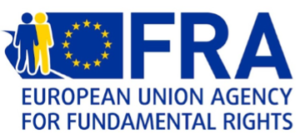 EU gender-based violence survey. 25 November 2024
EU gender-based violence survey. 25 November 2024
The survey represents women aged 18 to 74 from across the EU and captured experiences of physical, sexual and psychological violence, including domestic and non-partner violence. It also reports on sexual harassment at work.
A third of women in the EU have experienced violence at home, at work or in public. Young women report having experienced higher levels of sexual harassment at work and other forms of violence than older women. Yet violence against women often remains invisible as only every fourth woman reports incidents to the authorities (the police, or social, health or support services). These are some of the findings of the EU survey on gender-based violence conducted from 2020 to 2024 by Eurostat (the statistical office of the EU), the EU Agency for Fundamental Rights (FRA) and the European Institute for Gender Equality (EIGE).
PUBLICATIONS
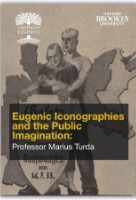 Eugenic Iconographies and the Public Imagination. Marius Turda, Oxford Brookes University, 2024.
Eugenic Iconographies and the Public Imagination. Marius Turda, Oxford Brookes University, 2024.
Professor Marius Turda explores the history and impact of the eugenics movement. He delves into the origins of eugenics, its rise to prominence, and its influence on social and health policies worldwide. The work highlights the visual and public iconographies used to promote eugenic ideologies, examining their role in shaping societal attitudes and reinforcing discriminatory practices. Through this digital exhibition, the text invites reflection on the legacy of eugenics and its ongoing implications in contemporary debates about genetics and human rights. Download Flipbook here
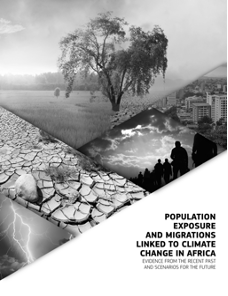 Population Exposure and Migrations linked to Climate change in Africa. S. Migali & F. Natale, Publications Office of the European Union, Luxembourg, 2021.
Population Exposure and Migrations linked to Climate change in Africa. S. Migali & F. Natale, Publications Office of the European Union, Luxembourg, 2021.
Many public debates and political discourses in the recent years have highlighted the impact of climate change on migration. These debates are still influenced by early estimates, which predicted that millions of people would be fleeing climate change effects. Part of this alarmist narrative is linked to a lack of definition of climate migrants which also hinders the design of policies to tackle the issue.
Over the years, EU policy has evolved from ad hoc initiatives and definitions of migration and climate change as threat multipliers towards a more holistic, balanced and integrated approach. This reflects the fact that climate change impacts stretch across policy areas, institutional boundaries and geographic borders and therefore cannot be addressed in isolation.
The main purpose of this report is to contribute to the ongoing integration of EU policies on climate change, adaptation and migration. The specific objectives are:
- to identify associations between climate change and displacement in Africa, in recent decades;
- to provide spatially explicit estimates of populations exposed and vulnerable to climate change impacts up to 2070 for several scenarios of climate change1 and socio-economic
OPPORTUNITIES
UPCOMING EVENTS
The International Council of Psychologists 83rd Annual Conference
JOIN the International Council of Psychologists in Rotterdam, Netherlands for its 2025 Annual International Conference!
This vibrant conference will celebrate ICP’s mission to support Human rights, Dignity, and Justice: Social Inclusion and Migration
Location: Rotterdam, Erasmus University College
Registration and Information: https://icpweb.org/icp-annual-conference/icp2025/
Convening the global sustainability community. 6–19 June 2025, Istanbul Congress Centre, Türkiye.
The Global Sustainable Development Congress brings together the world’s leading thinkers, policymakers and actors from different sectors to drive new alliances and create positive action for a more sustainable future. Over four days, keynote speakers, panellists and representatives from our track and global content partners will share their insights on health, sustainable cities, clean energy, AI, gender equality, the environment and much more.
CONTACTS: Published by the Global Network of Psychologists for Human Rights – www.humanrightspsychology.org
Disclaimer: The website of the Global Network of Psychologists for Human Rights (GNPHR) contains articles, events and news about the domain where psychology and human rights intersect. The information presented in this Bulletin, does not imply that the GNPHR shares the views and beliefs in the articles.
- @GNPHR1
- How to get involved – read how you can contribute to the global network
- Consider contributing a Blog/Commentary
- News and Bulletins from the GNPHR – Subscribe to GNPHR
- Email addresses:
Ways to Participate in Global Network Activities
- Share Your Experiences and Examples
One of the best ways to illustrate the intersection of psychology and human rights is through example. We are looking for examples of your encounters with human rights issues in your professional life. You might describe a time when you protected (or failed to protect) human rights, or advocated for what you saw as a human rights issue. The events might be in your clinical, research, academic, applied, or volunteer work. Please send your narrative / story (500-1000 words) to Marlena Plavšić (marlena_plavsic@hotmail.com). We will compile these for publication in the GNPHR Bulletin and on the website. Please also indicate if you would like your stories to remain anonymous. - Share your Expertise and Opinions
We invite you to contribute a blog or opinion piece on general human rights issues; human rights education or strategies for raising the profile of human rights within psychology or your professional life. Students are welcome to contribute, including on student needs for learning about and addressing human rights. Please contact the GNPHR Blog editor (blogeditor@humanrightspsychology.org) with ideas for the article you would like to write! - Send articles/news/events
If you come across a human rights article or news, or know of an upcoming hunman rights event, please send for publication in the Bulletin. Send to the Bulletin editor Polli Hagenaars (polli.hagenaars@gmail.com).

 Together, We Build HOPE
Together, We Build HOPE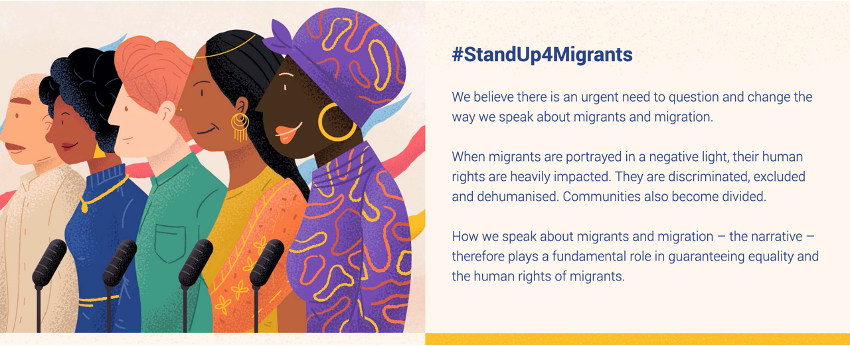
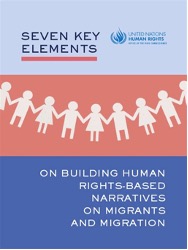 Seven Key Elements on building Human Rights-based narratives on migrants and migration.
Seven Key Elements on building Human Rights-based narratives on migrants and migration.
